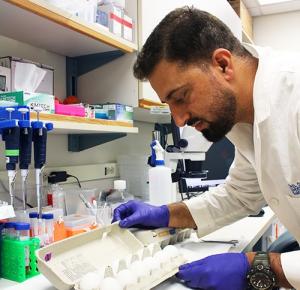This month we hear how UBC researchers are using chicken eggs to fight childhood cancers. We learn how online dating changes our partner selection and UBC Professor Samantha Dawson breaks down TikTok’s ‘orange peel theory.’
How Chicken Eggs Can Help Fight Childhood Cancers
Unlike adult cancers, which are often linked to lifestyle and environmental risk factors, the cause of many childhood cancers remains unknown.
And while advances in research and care have greatly improved chances of survival, cancer remains the second-leading cause of non-accidental death among children in Canada.
“Childhood cancers are unique in that they not only grow differently than adult cancers, but they respond to treatments differently too,” says UBC’s Dr. James Lim, an associate professor in the faculty of medicine’s department of pediatrics and investigator at the Michael Cuccione Childhood Cancer Research Program at BC Children’s Hospital Research (BCCHR) Institute.
Right now, fewer cancer drugs are considered safe for children, so when a conventional treatment, like chemotherapy fails, or if the cancer returns, the road ahead for children and their families can seem daunting.
But what if it was possible to bring new hope by pinpointing which cancer treatments have the best chance of success before they are even administered to a child?
In the first laboratory of its kind in Canada, Dr. Lim and his colleagues are tackling that very question — using a surprising, but powerful research tool. Read more
Dating in the digital age: How online dating changes our partner selection
The growing use of online dating websites, apps and chatrooms has an influence on the types of romantic partners Canadians choose, according to a new UBC sociology study.
The study, published last month in the Journal of Marriage and Family, examined the relationship between how heterosexual couples meet in Canada and their selection of partners, in terms of education, race, nativity and age.
Researchers found that online dating promotes relationships between people of different education levels and those of different immigrant status (i.e., Canadian-born individuals and immigrants to Canada). Online dating also decreases the likelihood that people partner with someone of a different age. Read more.
UBC Professor comments on TikTok’s ‘orange peel theory’
TikTok's trending 'orange peel theory' features people telling their partners they want an orange — and seeing whether their significant other peels the fruit before giving it to them. Samantha Dawson, an assistant professor at the University of British Columbia, breaks down the trend with CBC News and unpacks how effective the theory is.
